2019 Summer Experiences
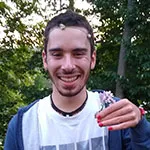
Reuben Gelley Newman '21
At the invitation of Dr. Don James McLaughlin, who was a visiting professor at Swarthmore during the 2017-2018 academic year, I gave a Skype conference presentation at the Whitman 200 Conference in Bolton, England, on May 24th. My presentation discussed Walt Whitman’s (possibly erotic) relationship with Herbert Gilchrist, a young British painter, while “the Good Gray Poet” endured and recovered from paralysis during the late 1870s. I also attended International Whitman Week, a weeklong seminar on the poet’s life and work that was held this year in New York City. The week included discussions and presentations by renowned Whitman scholars, and included a visit to Whitman sites around the NYC area, including his Long Island birthplace. Lastly, I participated in the New York State Summer Writers Institute at Skidmore College for two weeks, studying with poets Campbell McGrath and Vijay Seshadri.
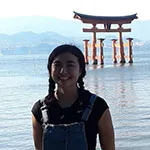
Maya Kikuchi '20
Over the summer, I worked on a longer fictional project with the Morrell-Potter stipend in fiction. I traveled home to Hawaii and then to Japan to conduct research on a story which initially was set to be about Japan and Japanese Americans in Hawaii. In Japan, I stumbled across another story idea that I am working on this semester as part of a Directed Creative Writing Project. My novel project covers themes of foreignness, language, cultural values around silence, and Ultimate Frisbee.
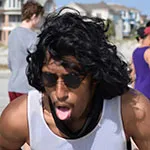
Sagnik Gayen '20
I did research about comics with Professor Yvonne Chireau of the Religion department. This was my second summer working with her. Comics began appearing in their recognizable modern form in the late 19th century. From the very beginning the medium has had a fascination with depicting black people in stereotypical or otherwise disparaging ways. These past two summers, I've explored depictions of black king figures, noting common characteristics and tracing their change over time. Not only did I get to read comics, but I also engaged with works from comics studies, a surprisingly robust and burgeoning academic field.
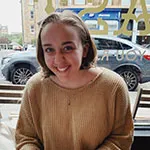
Elisabeth Miller '21
I spent my summer at the Smithsonian National Museum of American History as a Daily Programs intern. My job mainly focused on facilitating conversations with visitors about various historical topics (if you ever want any fun facts about the transcontinental railroad or early American chocolate making, let me know) through “object based learning carts.” These carts contained artifacts that visitors could touch and ask questions about, and therefore allowed them to interact with history in a more tangible way than simply looking at an object behind glass and reading an academic description of it. The idea behind these carts is to make history and museum culture more accessible to all visitors, including children, visitors from other countries, and other groups who have typically been excluded from museums. Throughout the summer I learned a lot about the challenges and benefits of working in the nonprofit world, as well as about the unique position that the American History Museum is in as an apolitical institution tasked with telling a history that needs political contextualization.
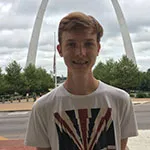
Tom Jensen '20
Last Summer I traveled south of the Equator to Nairobi where I worked at the Busara Center for Behavioral Economics, along with fellow Swarthmore students William Han and Eleanore Lee.. Behavioral Economics studies the effects of psychological factors on economic decision-making and represents a departure from the previous strict classical and theoretical view that had long dominated economic thought. Though my work varied on a weekly basis, I focused upon conducting research on vaccination campaigns in sub-Saharan Africa to help prepare the Kenyan government for the later roll-out of the HPV Vaccine. I undertook both quantitative and qualitative analyses of previous health delivery systems to provide information useful for ensuring that the HPV Vaccine campaign would hit high coverage targets. Other work I conducted at the Busara Center included working on a research experiment designed to see the effect of workforce motivation on wellbeing and the designing of laboratory games/measures to quantify subjective responses to stimuli.
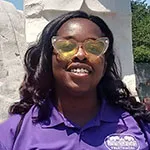
Alexis Riddick '20
I spent my summer working as a mentor for the Swarthmore Summer Scholars Program (S3P). As a mentor, my duties were that of both a TA and an RA. I was a Writing TA under the guidance of Professor Schmidt from the English Department. As an S3P mentor, I spent a lot of time with the students in Palmer Hall -- playing cards, watching movies, building connections -- as well as in the classroom. In Writing class, we focused on different techniques and topics: reverse outlining, identifying and crafting good thesis statements, nonviolence as an argument, counterarguments, etc… My favorite part was working with students in study hall and in the more unstructured parts of class, essentially guiding them with brainstorming and pre-writing assistance. One unexpected pleasure was helping students discuss tough ideas for the more social science articles we had to read, and as someone with a foot in humanities, social sciences, and ethnic studies, I was happy that I could use my background knowledge to help them close-read and breakdown arguments into more manageable pieces. My students are absolute gems, and Swarthmore is blessed to have them.
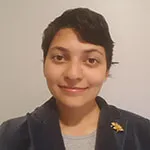
Shaoni White '21
This summer I completed an independent research project on the role of marginalized characters in the budding genre of contemporary audio drama podcasts. In order to figure out why the portrayal of queer characters and characters of color in fiction podcasts is so unusual, I researched the history of radio dramas and drew on research from many disciplines, including English literature, social history, linguistics, and television studies. I realized that because in audio-only mediums, speakers’ voices are broadcast without a visual representation of their body, audio fiction often subtly challenges racist, sexist, and transphobic ideologies that claim a person’s body is the only thing that defines them. I wrote an academic paper of over 10,000 words that I hope to eventually publish. This project gave me experience with long-term independent academic research and helped me further understand how fiction influences society and vice versa.

Bayliss Wagner '21
This summer, I interned on a team with journalism-minded web designers and developers at The Philadelphia Inquirer’s new ‘Innovation Desk.’ In the first project I worked on, we used public water quality data for Delaware and Jersey Shore beaches to display in accessible format which beaches were closed, open or under advisory and for what reasons. It also includes weather, driving directions, and other features. I talked with state environmental control officials, lifeguards, and beach patrol directors to fact-check and find context for the data; I performed user testing to fine-tune the guide’s design; and I used Python to create a function that would scrape the data for Delaware beaches from its website and feed it into the web page, live, every hour. For my second project, I landed a dream pitch that turned out to be more difficult than I had imagined: another intern and I researched, took photos for, and wrote about roughly 25 Philly restaurants offering substantial gluten-free and/or dairy-free and/or vegan options. I then designed and developed (using Javascript, HTML, and CSS) this as an interactive web guide (publish date 10/04/19) that allows users to browse the restaurants by neighborhood and filter the list by dietary restriction. It also displays photos and information we had written about the restaurant and allows users to call the restaurants, go to their menus, and see the price range for each restaurant.



